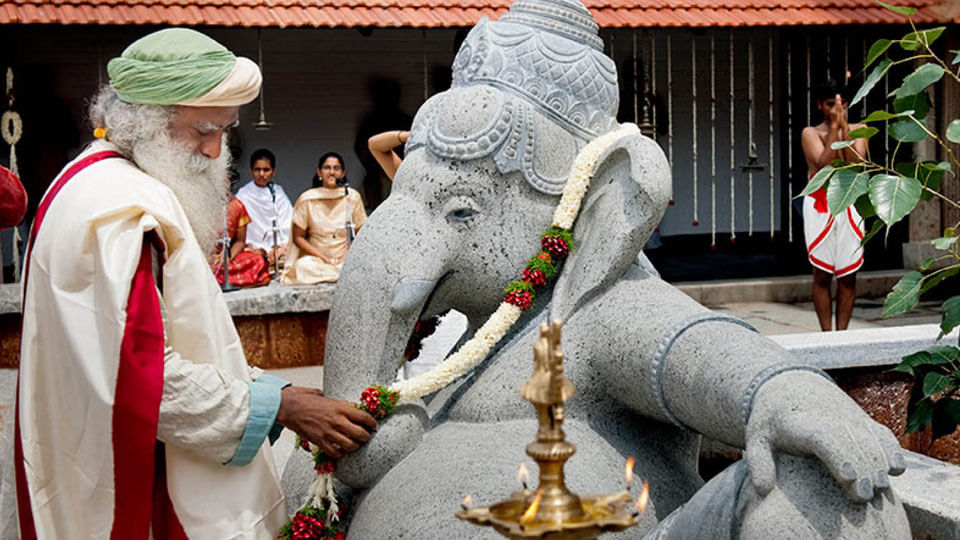Ganesh Chaturthi: A Celebration of Intelligence
Beyond rituals and celebrations, Sadhguru explains Ganesh Chaturthi as a reminder of life’s fluid nature—creation, dissolution, and the intelligence to navigate the in-between with clarity and balance.

The story begins with Shiva, the great ascetic yogi, leaving home and his consort, Parvati, for long periods. Driven by loneliness and maternal longing, she took an extraordinary step. She gathered the sandal paste from her body—carrying with it flakes of her skin—blended it with soil, and shaped it into a child. Into this figure, she breathed life.
Years later, when Shiva returned, he encountered a boy guarding his mother’s privacy. Neither recognised the other, and in anger, Shiva beheaded the child. Parvati’s grief and rage were immense, and to repair the tragedy, Shiva replaced the boy’s head with that of the leader of his ganas—strange, otherworldly beings who accompanied him. These ganas were said to have boneless limbs and forms unlike humans, which inspired artists to depict Ganesha with an elephant’s head, but still in every mantra, in every expression of devotion, it is Ganapati, and not Gajapati.
Subscribe
Thus Ganesha was born: from Parvati’s life-giving force, enjoined with the head of Shiva’s gana, symbol of intelligence and consciousness. Ganesha is the embodiment of balanced intelligence, the nemesis of all obstacles.
Ganesha is revered as Vigneshwara, the remover of obstacles. But this does not mean he magically erases difficulties. His real teaching is subtler: when we cultivate intelligence, balance, and clarity, obstacles dissolve on their own. They cease to be barriers and instead become stepping stones. Intelligence here is not cunning or manipulation, but an attunement to existence—an inner equilibrium that allows us to move through life with ease, within and without.
This understanding comes alive during Ganesh Chaturthi. For days, devotees craft idols of Ganesha, worship with food and music, and celebrate with devotion. The festival culminates in immersion of the idol in water. The making of the idol reflects Parvati’s act of creation, while its immersion echoes Shiva’s transformative act of destruction and renewal. Together these embody the same cycle of intelligence—bringing form into being, learning through it, and then releasing it.
Through Ganesh Chaturthi, we learn that true intelligence is never rigid or possessive, but fluid and unbound, like life itself, which constantly creates and dissolves. The practice of creating and then immersing the idol is a cultural way of acknowledging existence’s fluid nature—not clinging blindly to forms, but imbibing their qualities and letting go.
Ultimately, Ganesh Chaturthi is a celebration of moving from form to formlessness. True intelligence is not the accumulation of knowledge or being street smart; it is the capacity to live in harmony with existence, to flow without resistance, to transform obstacles into growth, and to expand beyond limitations.
So as you partake in this vibrant festival, savor the modaks, admire the artistry of the clay idols, and reflect on the deeper message of Ganapati: to cultivate intelligence that dissolves obstacles, celebrates unity, and honors the delicate balance of life itself.
May this Ganesh Chaturthi awaken that boundless intelligence and balance of creation in you. Wishes and blessings.



